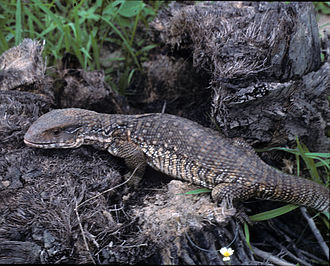Type the name of the breed you're looking for below
[wpdreams_ajaxsearchlite] Don't see the breed your're looking for? Click here and let us know!
Savannah Monitor
| Place of Origin and Range | This species is native to Eastern and Southern Africa. |
| Description | The pattern of colouration of the skin varies according to the local habitat substrate. The body scales are large, usually less than 100 scales around mid-body, a partly laterally compressed tail with a double dorsal ridge and nostrils equidistant from the eyes and the tip of the snout. |
| Morph Patterns Available | No |
| Adult Size | Can grow up to 6 feet (1.8m) |
| Accommodation | These monitors live in rocky habitat. Be sure to secure any rocks in the cage before adding substrate to prevent injury to your monitor from being crushed by shifting rocks. They require large enclosures, temperatures around 100 °F (37 °C). Include a water dish and plenty of hiding spots. Two adults should be given no less than 100 square feet to roam. |
| Lifespan | Can live up to 10 years |
| Feeding / Diet | Their main foods in captivity are whole prey, such as mice, rats, snakes, lizards, freshwater mollusks, small birds, large roaches, crustaceans, fish, and eggs. A varied diet with dusted insects, crayfish and other low fat foods is by far the best, but they will readily eat mice. |
| Other Considerations | Very aggressive species of monitor. Separate according to size and sex. Males will fight for space. |



